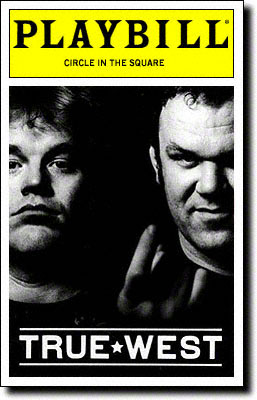
This very morning, I passed a poster for a George Bernard Shaw play and thought, “Don’t wait, Fons; see a show.” When you’re in NYC for longer than a few days, it’s easy to allow art opportunities to slip away because the sense of urgency isn’t there. You have time, you can get to that show before it closes, you can see that exhibit before it’s gone, etc.
The actor Philip Seymour Hoffman died this morning, or maybe he died last night or Friday night; only the coroner knows for sure. Hoffman was found, maybe at the moment I was looking at that poster for the Shaw play, in the West Village where he lived. The New York Times reports he had a needle in his arm and that there was an envelope of heroin nearby. An addict’s nightmare would be one without the other, I guess.
When I was in the city in 2000, I went to see True West by Sam Shepard at Circle in The Square Theater on Broadway. Philip Seymour Hoffman and John C. Reilly careened through that delicious brother-against-brother play, hitting the highs and the lows with this painful tenderness that made the crashes even worse (or better, depending on how you see your emotional manipulation as an audience member.) They made that theater ache, man. I didn’t come up for air the whole time. How could I? They weren’t breathing. That script was bare-knuckled before those guys got to it; in the hands of a director who had the foresight to a) cast Hoffman and Reilly and b) get out of their way, it was a life-changer.
I mean it. I was at a place in my life where I had to decide if I was going to get married to the theater. After seeing True West, I knew I would. I completed my theater degree from the University of Iowa and promptly moved to Chicago, still the best place in the country to make stuff to put onstage. I helped found the (now) wildly successful Gift Theatre Co., and found an artistic home with the Neo-Futurists. Someday, we’ll talk more about all that, but not now.
This is about the actor I saw in True West fourteen years ago who showed me that good theatre is so hard to make, you’ll see it about as often as you see a shooting star — and when you see it, your DNA changes. Philip Seymour Hoffman, in one role, in one production, wiped every crappy college show from my eyes and removed the illusions I had about what I thought I knew about making theatre. His ferocious performance was in fact an act of kindness to me, and he had no idea I existed. But I did, in that dark theater, and I was watching him. He helped crystalize for me a vision of the kind of work and the kind of art American theatre is capable of and when I heard he died, my hand shot up to my heart and I could feel it beating.
I’m sorry you were addicted to heroin, Philip Seymour Hoffman. That is a terrible drug and I know you were afraid when you died. But it’s over, now, and in all the good ways — only the good ways — you’re still making great art. You made it in front of a lot of people who were watching, hard, and plenty of us are still alive, still trying to reach your standard.
* “A ghost light is an electric light that is left energized on the stage of a theater when the theater is unoccupied and would otherwise be completely dark.”

merie
Oh that must have been an absolutely wild and awesome production of True West! What a memory to have of PSH. (Unrelated to the actor – for years my daughter thought that warm crispy bread was called “toast-austin-toast” because my husband and I find it impossible to talk about toast without slipping into that scene.)